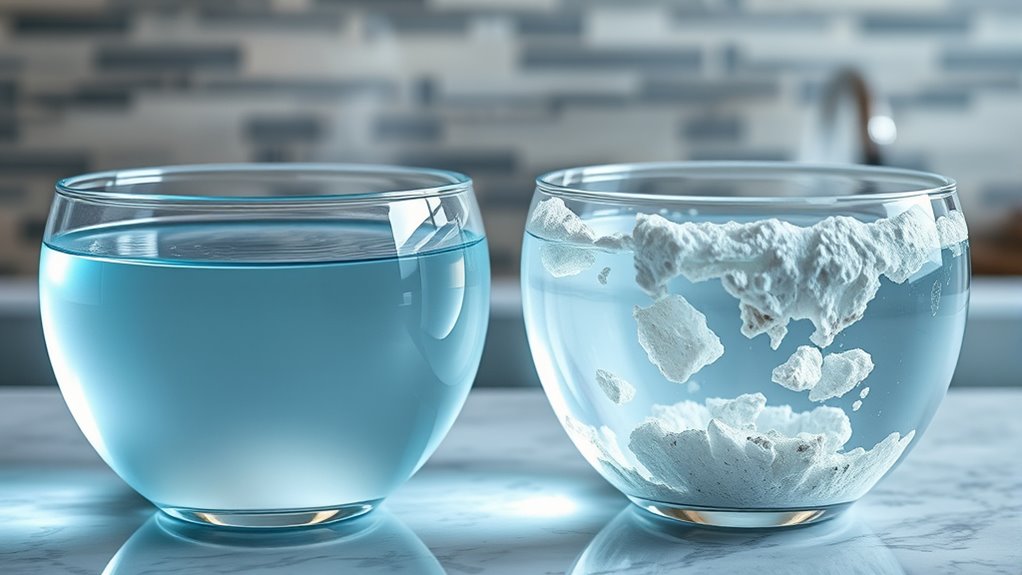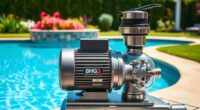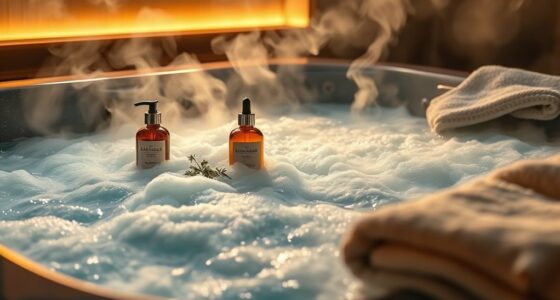Managing soft versus hard water in your spa involves understanding their signs and applying the right treatments. Soft water may feel slippery, cause corrosion, and produce less foam, while hard water can leave mineral deposits, cloudy water, and soap scum. To keep your spa in top shape, you’ll need specific filtration, water softening, and balancing techniques. By paying attention to water signs and maintenance strategies, you’ll guarantee peak performance and comfort—more tips are ahead to help you master this process.
Key Takeaways
- Regularly test water chemistry to identify signs of soft or hard water early and adjust treatments accordingly.
- Use appropriate filtration, ion exchange, or mineral sequestrants to effectively manage mineral levels.
- For soft water, add stabilizers and pH buffers to prevent corrosion and skin irritation.
- For hard water, implement mineral removal and water softening systems to prevent scale buildup and equipment damage.
- Maintain routine maintenance, including filter cleaning and water testing, to ensure optimal water quality and system performance.
Understanding Water Types and Their Impact on Spas
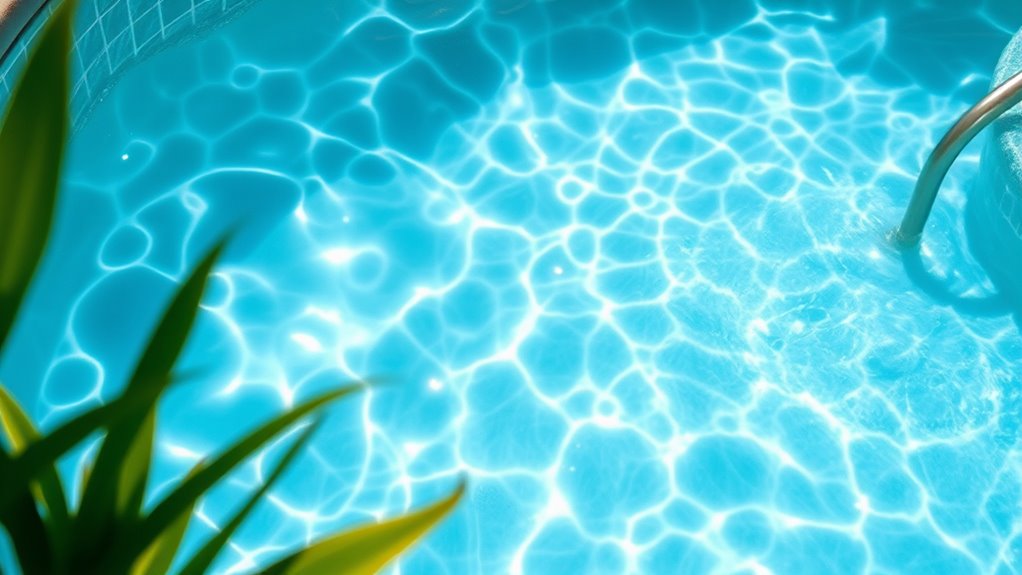
Understanding water types is essential for maintaining a healthy and efficient spa. Knowing whether your water is soft or hard helps you anticipate potential issues and choose the right treatment methods. Soft water contains fewer minerals like calcium and magnesium, making it gentle on spa equipment and easier to balance chemically. However, it can sometimes cause corrosion or skin irritation if not balanced properly. Hard water, on the other hand, has high mineral content, which can lead to scale buildup, clogged filters, and cloudy water. Recognizing your water type allows you to adjust your maintenance routine accordingly, preventing damage and ensuring your spa stays clean and inviting. Additionally, vetted products are available that can help you manage water hardness more effectively. Using appropriate filtration systems can further improve water quality, especially in areas with extremely hard or soft water. Being aware of your water’s mineral content enables you to select the most suitable water treatment options and maintain optimal water conditions. Understanding water chemistry helps you prevent equipment damage and maintain a comfortable spa environment. By understanding these differences, you can maintain ideal water quality and extend your spa’s lifespan.
Signs of Soft and Hard Water in Your Spa
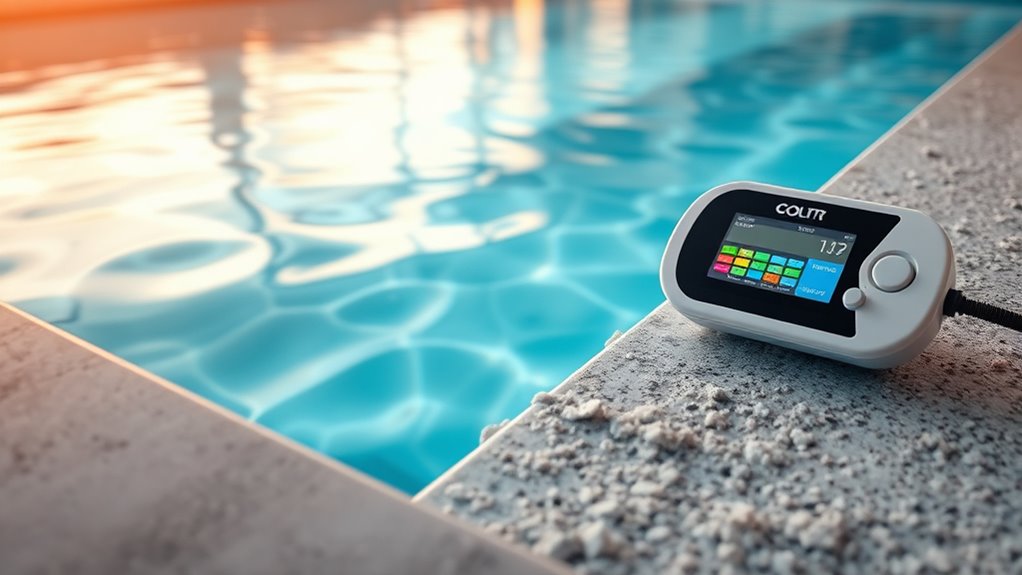
Recognizing the signs of soft and hard water in your spa is essential for proper maintenance. If your water leaves a greasy film or soap scum buildup, it’s likely hard water, rich in minerals like calcium and magnesium. Hard water can cause scale deposits on your spa’s surfaces and equipment, making them less efficient. Additionally, water chemistry plays a crucial role in how your spa responds to different water types and can influence the effectiveness of your treatment routines. Proper understanding of water treatment methods can help you address issues caused by mineral buildup. Conversely, soft water often produces less foam and may feel slimy or slippery when touched. You might notice your skin feeling dry or your hair becoming dull after a spa session. Furthermore, cloudy water or persistent cloudiness despite filtration can signal soft water. Being aware of these signs helps you identify water type early, so you can take appropriate steps to maintain optimal spa conditions. Understanding water quality is also crucial for preventing damage and ensuring a safe, relaxing experience.
Treatment Methods for Soft Water
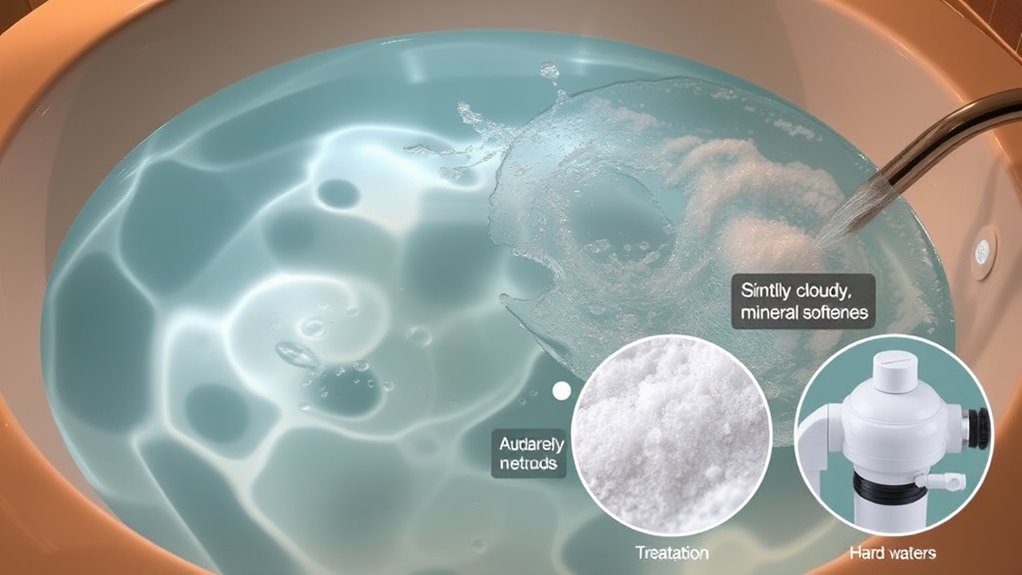
When dealing with soft water in your spa, you’ll need specific treatment methods to keep the water balanced and comfortable. Soft water tends to be low in minerals, which can cause the water to become corrosive and damage your equipment or irritate your skin. To address this, you should add a mineral stabilizer or a pH buffer designed for soft water. Regularly test your pH and alkalinity levels, aiming for balanced ranges. Using a non-chlorine sanitizer like bromine can help maintain sanitation without destabilizing the water chemistry. If the water becomes too acidic, add a pH increaser. Remember, maintaining proper chemical levels is key to preventing corrosion and ensuring a safe, pleasant spa experience. Incorporating best laundry detergents can also help prevent mineral buildup in your spa’s filtration system. Additionally, understanding water chemistry principles can assist in diagnosing and correcting issues with your spa water, especially when managing water balance in soft water conditions.
A thorough understanding of water hardness can further aid in adjusting your treatment approach to prevent scaling or corrosion.
Treatment Strategies for Hard Water
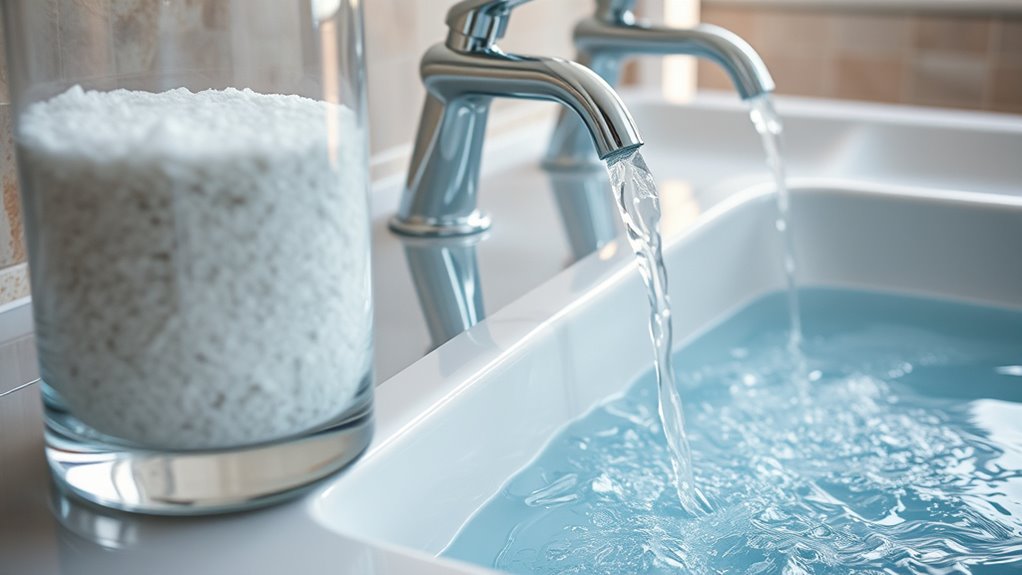
When treating hard water in your spa, you can choose from mineral removal techniques like filtration or ion exchange to reduce mineral content. Water softening options, such as salt-based or salt-free systems, help prevent scale buildup and improve water quality. Chemical treatment methods, including pH adjusters and scale inhibitors, offer additional ways to manage hardness effectively. Additionally, understanding the differences between leasing vs. buying can help in making informed decisions about water treatment equipment investments. Implementing water testing regularly can ensure your treatment methods remain effective and your spa water stays balanced, especially with the availability of advanced solar-powered solutions that can support eco-friendly water management systems. Incorporating sound healing science principles into your maintenance routine can also promote a healthier spa environment by reducing stress and enhancing overall wellness.
Mineral Removal Techniques
Dealing with hard water in spas requires effective mineral removal techniques to prevent buildup and maintain water quality. One common method is using chemical sequestrants, which bind minerals like calcium and magnesium, keeping them in suspension and reducing scale formation. Regular filtration also helps remove suspended mineral particles, improving clarity. You can also employ ion exchange systems that replace calcium and magnesium ions with sodium, effectively softening the water. Additionally, acid treatments can dissolve existing mineral deposits on spa surfaces and equipment. Maintaining proper water circulation ensures these treatments distribute evenly, maximizing their effectiveness. Water testing kits are essential tools to monitor mineral levels accurately, enabling you to adjust your treatment regimen accordingly for optimal results. Properly calibrated testing equipment enhances the precision of your water chemistry assessments. Consistent testing and adjusting of water chemistry are essential to prevent mineral buildup and keep your spa running smoothly. Combining these strategies helps you control mineral levels and prolong your spa’s lifespan.
Water Softening Options
To effectively combat hard water in your spa, you need reliable softening options that target mineral content directly. Consider installing a dedicated water softener, such as a salt-based ion exchange system, which replaces calcium and magnesium ions with sodium. Alternatively, using a reverse osmosis system can remove minerals at a molecular level, producing soft, pure water. You might also opt for chemical softening agents, which precipitate minerals for easier removal. Here’s a quick comparison:
| Softening Method | Pros | Cons |
|---|---|---|
| Ion Exchange System | Effective, long-lasting | Higher initial cost |
| Reverse Osmosis | High purity water | Slower, maintenance needed |
| Chemical Softening | Easy to apply | Ongoing chemical cost |
| Magnetic Softening | Non-invasive, simple | Less proven effectiveness |
| Filtration Systems | Cost-effective, straightforward | Limited mineral removal |
Additionally, water softening efficiency can vary based on the method chosen, so selecting the right system is crucial for maintaining water quality in your spa. Understanding the different softening techniques can help you make an informed decision tailored to your specific needs. It is also important to consider system maintenance to ensure consistent performance over time. Moreover, evaluating cost considerations can help you select the most practical option for your budget and spa requirements.
Chemical Treatment Methods
Chemical treatment methods offer a practical approach to managing hard water in your spa by directly addressing mineral buildup. You can add specialized water conditioners or sequestrants that bind calcium and magnesium ions, preventing them from forming scale. Regularly dosed algaecides and pH adjusters help maintain water balance, reducing the risk of mineral deposits. It’s important to test your water frequently to determine the right chemical levels and avoid over-treatment. Using these chemicals correctly ensures minerals stay suspended rather than settling on surfaces or clogging equipment. Proper chemical treatment can also influence angel number interpretations, signaling that positive changes in your love life are possible through mindful actions. Additionally, understanding economic growth factors in Indonesia can help you make informed decisions about investments related to spa maintenance and equipment. Keep in mind, chemical treatments work best when combined with proper filtration and regular maintenance. This approach helps keep your spa water clear, balanced, and free of damaging mineral deposits, prolonging the life of your equipment and enhancing your overall spa experience.
Maintaining Water Balance and Quality
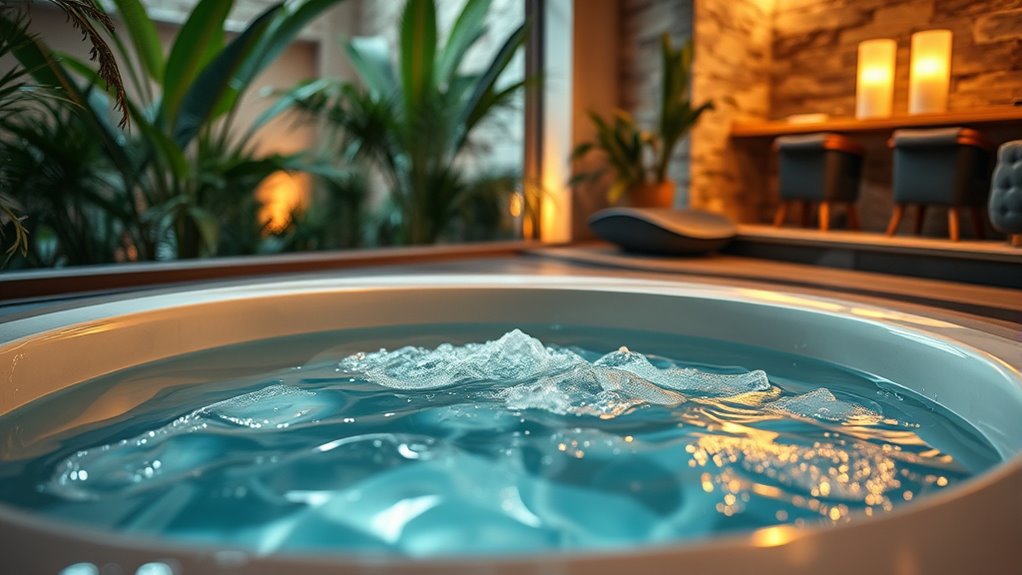
Maintaining water balance and quality is essential for guaranteeing a safe and enjoyable spa experience. You should regularly test your water’s pH, alkalinity, and sanitizer levels to keep everything within ideal ranges. Proper pH levels prevent skin irritation and equipment damage, while balanced alkalinity stabilizes pH and protects your spa’s components. Consistently monitoring these parameters helps you avoid issues like cloudy water, scaling, or corrosion. Use the right chemicals to adjust levels as needed, following manufacturer instructions carefully. Keep your water clean by skimming debris and vacuuming the pool floor. Changing filters routinely also helps maintain clarity. By staying vigilant and proactive, you guarantee your spa water remains inviting, safe, and of high quality for every soak.
Preventative Measures and Best Practices
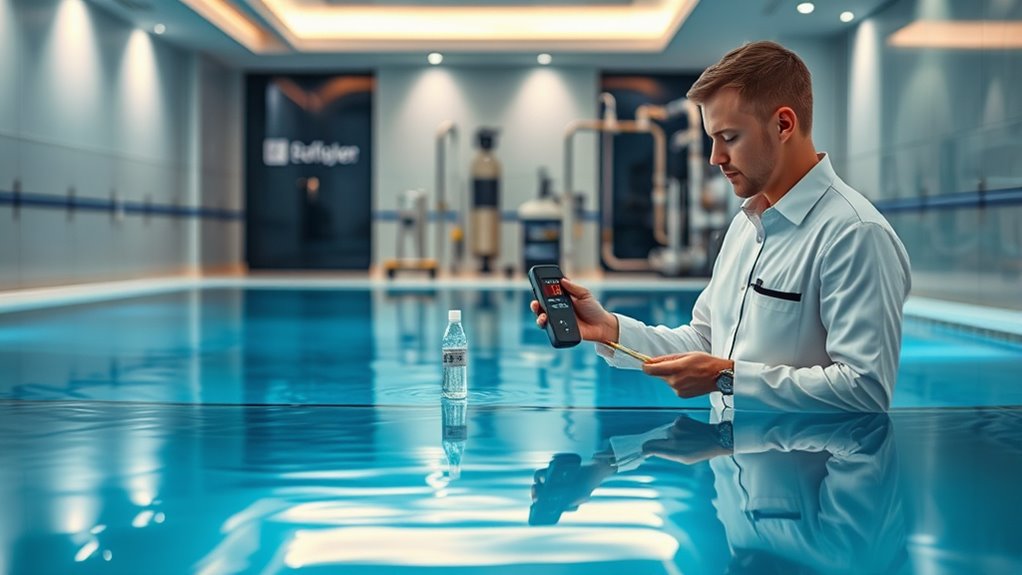
Regularly examining your spa’s water and equipment can prevent many common problems before they start. Check water levels, pH, and sanitizer levels weekly to catch issues early. Clean filters and test for mineral buildup, especially with hard water. Use appropriate water softeners or conditioners to prevent scale formation. Keep your equipment’s surfaces and jets free from debris and mineral deposits.
Here’s a quick guide:
| Action | Frequency | Purpose |
|---|---|---|
| Test water chemistry | Weekly | Maintain balance |
| Clean filters | Monthly | Ensure proper filtration |
| Inspect for mineral buildup | Bi-weekly | Prevent equipment damage |
| Adjust water treatments | As needed | Prevent scale and corrosion |
Following these practices keeps your spa running smoothly and extends its lifespan.
Frequently Asked Questions
How Often Should I Test My Spa Water for Hardness Levels?
You should test your spa water for hardness levels at least once a week to ensure it’s balanced. Regular testing helps you catch any changes early, preventing damage to your spa’s equipment and guaranteeing a comfortable soak. If you notice your water feels slimy or spots develop on the surface, test more frequently. Keeping an eye on hardness levels helps maintain ideal water quality and prolongs your spa’s lifespan.
Are There Eco-Friendly Options for Treating Hard Water in Spas?
Think of eco-friendly options like gentle rain nourishing a garden. You can use natural water softeners like baking soda or Epsom salt, which are less harsh on the environment. Iron and manganese removers made from natural minerals also help. These options work quietly behind the scenes, transforming your spa water without harming the planet. Always follow manufacturer instructions to guarantee safe, effective treatment that keeps your spa eco-conscious and inviting.
Can Soft Water Cause Corrosion in Spa Equipment?
Soft water can cause corrosion in your spa equipment because it lacks minerals like calcium and magnesium that protect metal surfaces. When you use soft water, your equipment’s metal parts are more vulnerable to rust and damage. To prevent this, you should monitor water pH levels regularly, add corrosion inhibitors if needed, and guarantee your water balance remains ideal. Proper maintenance helps extend your spa’s lifespan and keeps it running smoothly.
What Are the Long-Term Effects of Untreated Hard Water?
Untreated hard water can cause significant long-term problems. Over time, minerals like calcium and magnesium build up inside your spa’s pipes and equipment, leading to clogging and reduced efficiency. This buildup can cause corrosion, leaks, and costly repairs. You might also notice cloudy water and soap scum. To protect your investment, it’s essential to regularly treat and maintain your spa water, preventing mineral deposits from causing permanent damage.
Do Different Spa Materials React Differently to Soft or Hard Water?
Imagine you’re installing a new spa with acrylic sides and ceramic tiles. Different materials react differently to water hardness; acrylic resists mineral buildup, while ceramic tiles may develop stubborn deposits if the water is hard. You’ll notice that soft water prevents scaling on metal components, but hard water can cause staining or corrosion. So, understanding your spa’s materials helps you choose the right water treatment to keep it pristine and functioning well.
Conclusion
Now that you know how to identify and treat soft and hard water in your spa, you’ll keep it pristine and inviting. Regular maintenance and smart treatment choices are your best allies, much like a trusty squire guarding a castle. Remember, balancing your water isn’t a quest from a medieval tale but a simple task to enjoy sparkling, relaxing soaks. With a little effort, your spa will be the envy of every knight in shining armor!
